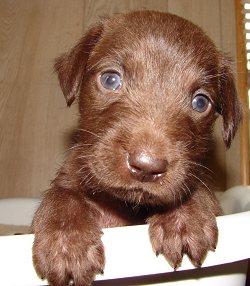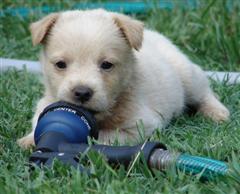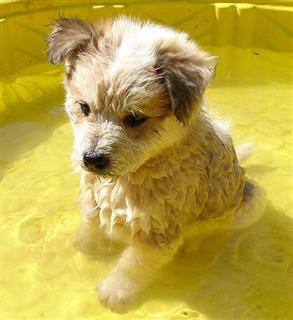Disciplining Your Dog - Firm, Yes! Angry, Never!
After regular exercise, what your dog needs most is discipline. But it's vital to understand that by "discipline," I do not mean punishment.
Like humans, dogs need to be corrected when they break a rule -- and then shown an acceptable alternative behavior. As the pack leader, you let your dog know when to wake up, when to eat, and how to interact with humans and other dogs. A successful routine comes by setting rules, boundaries, and limitations -- and enforcing them in a way your dog can clearly comprehend. We all want to get along with the dogs who share our home, even if it just means less barking and tearing around the back yard as you're trying to take a quick nap upstairs.
Many people try to eliminate unwanted behavior in their dogs the way we punish a child -- by taking away a privilege or giving a "time out." But when you send a dog to another room or deny her a trip to the dog park, your dog simply doesn't connect that punishment with the offending behavior. Dogs live in the now! They understand only the most immediate cause and effect.
What a dog needs instead is correction -- a simple and immediate response. A dog in a natural pack would never receive a "time out" for unacceptable behavior. Rather, observation indicates that a dog in charge will deal out a swift correction -- via touch, low growls, or body language, which conveys a simple, clear message: "That's not how we do things around here, Mister."
And natural pack leaders should never be angry or frustrated when they give corrections! They should be quick, matter-of-fact, and to the point. And they don't hold grudges -- once the behavior is corrected, the errant dog is instantly back in the pack leader's good graces.
How to Let Your Dog be a Dog
Dogs are animals, with needs that were created by nature long ago.
Many dog owners are surprised to learn that dogs dont need constantlove and affection to lead healthy, balanced lives. Why do smart, educated people make this mistake? Because they forget that dogs are animals, with animal needs set by nature long before humans got involved.
What dogs really need is a calm, assertive pack leader not birthday parties, cute outfits or constant affection. Since most dogs are born into the follower role that means your dog is looking to you to provide the calm, assertive leadership that hes hard-wired to seek.
But humans often develop a different plan for our dogs. We want to make them our babies or our family. When people see a nervous or shy dog they see it as human and console it like they would another human.
In the animal world this nurtures instability, something a pack leader would never do.
Most dogs that live in this country have shelter, food, and lots of love. These are the dogs that often become unstable because theyre not working for food and water. These dogs yearn for a pack leader to allow them to feel balanced and connected.
Wanted: Leadership
You know the best gift you can give to your dog? Let your dog be a dog, and become his calm, assertive, consistent leader.
Simply put, fulfill him before you fulfill yourself. Establish yourself as his pack leader and watch him blossom in the submissive role that nature had written for him long ago.
Tips for Retraining Humans
Your dog will set the rules if you dont learn how.
The number one mistake people make in their relationships with dogs is treating them like people. You wouldnt interact with a horse like you interact with your sister. So why do humans insist on treating dogs like people?
So many dog owners believe that their dogs will stop tearing up the couch if they just love them more or show them more affection.
These strategies might work in the structure of human relationships, but in the animal world, nature didnt hard-wire dogs to interact this way. Instead, nature instilled dogs with a powerful pack instinct. This way of being is how dogs communicate and experience the world.
If you love your dog, treat him like a dog. A dog needs a stable pack leader to lead a balanced and happy life. The recipe is really that simple. Humans are the ones that make these relations complicated. |
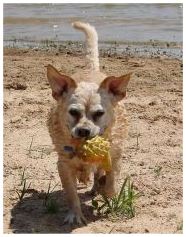 |
Retrain Your Brain
I realize this turns upside down most thinking about the human-dog relationship. But think about it if your husband mistook your needs for the needs of a chimpanzee, where would that leave you? Confused and disoriented.
Its the same for dogs. But their confusion and disorientation manifest in bad behavior such as tearing up the couch or barking constantly. Most of these dogs who are probably loved and well cared for by their owners feel lost in a vast ocean without a life raft. Think of the life raft as the strong, stable pack leader. He or she provides a source of strength and guidance that helps the dog navigate through a complex world.
Become His Leader
You can become your dogs pack leader by acting like an animal pack leader would. The pack leader tells the pack, through his calm, assertive energy, what do and where to go every day, all of the time. The pack leader doesnt project emotional or nervous energy and neither should you.
Your dog will look to you to establish rules, boundaries and limitations. Remember, your dog will set them if you dont.
Your dog is an animal, guided by animal instincts. Dogs have found themselves in an odd predicament by living with humans. But if you treat your dog like a dog and provide him with the pack dynamic he craves, your companion can live a rich, rewarding life -- even among humans.
Dogs are social animals and without proper training, they will behave like animals. They will soil your house, destroy your belongings, bark excessively, dig holes in your yard, fight other dogs and even bite you. Nearly all behavior problems are perfectly normal canine activities that occur at the wrong time or place or are directed at the wrong thing.
For example, the dog will eliminate on the carpet instead of outside; the dog will bark all night long instead of just when a stranger is prowling around outside; or the dog will chew furniture instead of his own toys. The key to preventing or treating behavior problems is learning to teach the dog to redirect his natural behavior to outlets that are acceptable in the domestic setting.
Obedience training should be fun and rewarding for you and your dog. It can enrich your relationship and make living together more enjoyable. A well-trained dog is more confident and can more safely be allowed a greater amount of freedom than an untrained one. A trained dog will come when called.
Enroll in a local dog obedience training class to learn the basics. Then most teaching and training can and should be done in your home. It is best to begin training in an area that is familiar to your dog and with the least amount of distractions as possible. When you feel both you and your dog are skilled at several obedience commands, then take these commands to different areas. Introducing distractions may seem like starting all over again, but it's worth the effort.
Keep the obedience training sessions short and sweet. It is dull and boring to schedule tedious and lengthy training sessions.
Instead, integrate training into your daily routine.
Make obedience training interesting and meaningful to your dog. If Puppy insists on following you from room to room while you are getting ready for the day, then insist he have something to do too. |
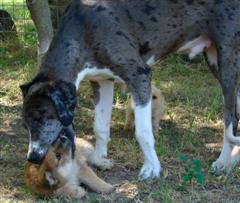 |
Rewards While Training
The single most important aspect of training is rewarding your dog for good behavior. The more times the dog is rewarded, the quicker he will learn. Therefore, it's essential that you set up situations repeatedly in order for your dog to get plenty of practice at doing the right thing. It's equally as important that you always praise your dog for good behavior instead of taking it for granted.
It's easy to forget to praise good behavior because it goes unnoticed. But the very nature of misbehavior gets our attention. We don't notice when our dog is lying quietly, but excessive barking gets our attention. How many of us take notice and praise our dogs when they chew their own toys? But we all go berserk when we notice our favorite pair of shoes chewed up! Praise and reward are the most important part of maintaining good behavior and preventing problems from arising.
Reprimands While Training
Some dogs feel they are constantly bombarded with, 'NO, Stop that, get off, Bad dog!' They tend to get used to it and so the reprimands become meaningless and are ignored. If most of our interaction with the dog is praise for good behavior, then reprimands will take on much more meaning. Whenever you find the need to reprimand your dog, immediately show him what you want him to do, then reward him for getting it right. If you catch him chewing the furniture, tell him, 'Off!' Then immediately direct him to his own toys, enthusiastically entice him to chew on them and praise him for doing so.
If done correctly, your voice alone is sufficient for reprimand. A correct reprimand is short, sharp and immediate. Don't continue to nag the dog and never reprimand him unless you catch him in the act. Never hit, kick, slap or spank your dog. This type of inappropriate punishment always creates more problems and usually makes existing problems worse. Not only will you have a barking, chewing dog, but one that is leery, hand-shy, fearful or aggressive.
References:
PerfectPaws.com
DogChannel.com
|
